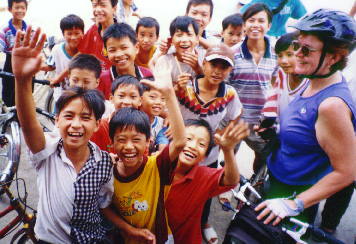
Deborah and Friends Along the Road

|
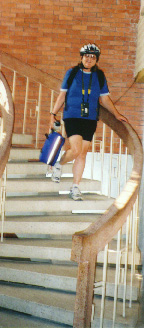
|
As we gathered in the courtyard and performed the comforting rituals of lotion, tire check, helmet fit, film loading, and a dozen other things, people came out on their balconies to take a look at the eccentric Americans. We were looking over our handlebars at the longest day, about 70 miles, though I very much doubted I'd ride the full distance.
Soon we were out in the countryside and moving at a pretty good pace in the warm morning. In the first few miles we hit a stretch of raw red unpaved road, dust rising in the wake of passing trucks and buses. I didn't mind the thought of some dirt riding, especially if it was hard-packed like this, but it wasn't too long before we were back on asphalt. |
|
|
|
|
Dong (from Ha Long) helps Rich bargain for his first pith helmet. In most of the country there are no real fixed prices, and bargaining is expected. Oddly the price seemed to go up during this exchange, not down. |
|
|
|
|
|
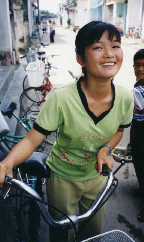 It's hard to see, but she's wearing a Bugs Bunny t-shirt. Just like the wiley rabbit to show up in the most unexpected places, isn't it? |
Some 20 or so miles into the ride it was starting to get quite hot, and I was already running out of water. I caught up to Manchurian Dong and asked him where the van was. He insisted that I take some of his water. We came to a small town together, and pulled up in the shade of a building to wait for the others. It wasn't long before a small crowd of youngsters had gathered -- very friendly and fascinated by the shocks on our mountain bikes, our apparel, everything. What the guides had said was true -- we were probably the first Western cyclists they had ever seen. As some of the other riders arrived, I unfolded my map and showed the kids our route from the border to Tien Yen. It was a delightful moment, reminding me why I've always preferred the countryside and small towns to cities.
|
|
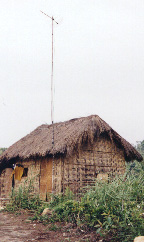 Above: Yes, that's an antenna. Not sure where the power came from -- possibly batteries or a generator. Radio is the dominant communication technology, with one for every ten inhabitants. By comparison, the ratio for television is 1 to 25 and for telephone, 1 to 80. Below: The houses in this region favor pastel shadings, done a bit more tastefully than at Virginia Beach. Many of them also had beautiful varnished doors with ornately bevelled and etched panes of glass. (photo by richard beattie) 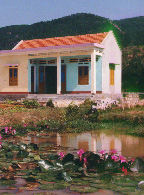
|
A few miles beyond the town we collected under some shade trees in front of a small shop. Lunch was here, we were told. The family brought out tiny plastic armchairs and a table, and we sat down. Not here, it turned out. Back on our bikes for a few more kilometers to catch up to the van. We were concerned about the feelings of the family we had just descended upon. Not to worry, Dong of Vietnam told us, he had explained it to them. We hoped he had dropped a few notes on them for their trouble, but it seemed unlikely. The van had pulled into the yard of an abandoned school, and we ate our peanut-butter sandwiches in the dappled shade provided by a grove of slender trees. The tiny leaves gave only slight cover from the noonday heat, and several riders escaped into the air-conditioned van. The ever-expanding entourage included two young Vietnamese women, Sen and Mai. Sen spoke a little English, and had kind of a flirtatious way about her. At least that's how it seemed. Our eyes kept meeting and rather than climb the language barrier, we would exchange a smile or a quick wink. Was she flirting or was I? The heat and cycling must have gone to my head. Our troupe had covered about 28 miles and I had planned to go at least 35 or 40. However, I felt content with the day's effort and didn't particularly care to spoil the moment by getting back on the road. Along with some others, I opted for the cool air in the passenger bus. The bus tried to act as the "sweep," which meant it spent most of the time behind Charles, who was a very deliberate rider. Perhaps they were also concerned that he might be the most in need of attention, though he was actually one of the strongest riders in the group. I thought it would be interesting to find out what was in the day's news, so I asked Sen if she might read us a headline or two from the Nhan Dan and tell us a little about the articles. I'm not sure if the problem was just her fears about her English, but this was something that I could not persuade her to do. Along the way, we came across a nasty accident, apparently a collision between a couple on a bicycle and a motorbike. After a brief stop to confirm that the victims were not too seriously injured, our Vietnamese guides (one of whom was a doctor) got back on board and insisted that we press on.
|
|
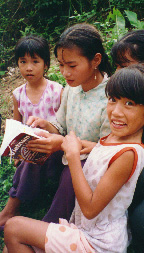 The Lonely Planet guide to Vietnam got a lot of use, and proved of interest even to these long-time residents of the country. (photo by deborah ruhe) |
Though the bus was traveling at a snail's pace, we still had some riders behind us. At one point we had to double back to pick up the Mississippeans, who had given out in the heat. A crazy man (not one of our party) wearing long gray socks on his arms flagged us down as we approached our fellow travelers. Jackie was with them, and had been amusing herself by playing teacher with some of the children who had gathered round. Johnny had clearly had the worst of the heat; he gladly climbed on board and began guzzling water to rehydrate. Back on the road, we overtook Charles in a small village that was hosting a soccer match. The Vietnamese are passionate about the game &endash; even to the point of ollowing the standings and scores of club teams in England. (In his book Shadows and Wind, Templar relates how the residents of Hanoi would sleepwalk through the workday after European matches, which are aired live in the wee hours of the morning, owing to the time difference).
|
|
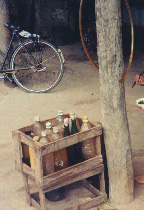 It doesn't take a lot of startup capital to have your own garage & bike shop. A rubber inner tube, a few bottles of assorted motor oils (and perhaps vinegar?) will do just fine. (photo by gail thompson)
|
I got off the bus and wandered behind the crowd, which was scattered along the sideline. A few heads turned our way, attention divided between the game and these strange visitors -- aliens attired in what appeared to be space helmets and some kind of synthetic bodywear. Again, fortunately, Johnny was in the vicinity with his video camera and attracted most of the attention. I trudged over to what had been pointed out as an old French fort. Except for the solitary statue at the far end, it was a bare and flat area surrounded by a low wall, on top of a slight rise. Other than that, there was little to suggest the earlier fortification. The gate was locked, so I walked back over to the van. We were parked beside a covered patio with a billiard table. Billiards were perhaps even more popular than soccer, a civilized way to beat the heat. We would see more and more of these rickety felt-covered tables along the way, or sometimes we'd just hear the clacking of the balls colliding in the dark interior of an open shop. The crowd was growing outside the bus, and one man in particular seemed to be pantomiming his sentiments and affections to Jackie through the window. "Be careful," I warned her. "Before you know it, he'll have you carrying two baskets on a wooden pole." But then he moved a little further along and made the same gestures to Johnny, so I could only conclude that he was just extremely gregarious or perhaps a man of very catholic tastes. Charles was in motion again, so we geared up and started trailing him once again. His stamina was remarkable and completely unaffected by the heat. But it must have been a nuisance for him to have to pedal along with a big bus creeping just behind him. We asked the bus driver to give a little space, but to little effect. "God, what the people here must think," I said. "It's just like that fable about the man, the boy, and the donkey -- look at all of the young Americans in the bus while the old man has to pedal ahead." "That's probably just what they think," Jackie said. "You know the Americans have no respect for their elders." We had a hearty laugh thinking how things might appear to those who didn't know the whole story. Truth was, Charles had probably lost respect for all of us striplings who were laying about in our air-conditioned support vehicle.
|
|
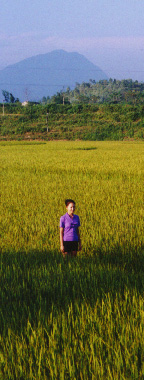 Long shadows at the end of the day and green fields. 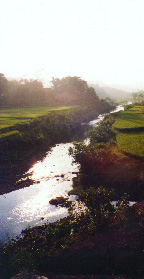
|
Someone needed to make a pit stop, so we pulled over at a nice spot overlooking a gorgeous valley turning into a darker shade of green in the late afternoon sun. Richard darted out and around the bend, following a dirt path to the east. The bus inched forward, and we next saw him waving excitedly, indicating either a good vista or a toilet venue. Then he inexplicably took off down the road, turning back again to signal us. In his pith helmet and khaki shorts, he looked quite the picture of the European explorer who had had too much sun. All the classic signs of dementia. In the distance, we could see Charles inching his way up the next ridge. "He's still going," Gail said. "He's walking his bike now." "He's still riding, I think. He could go on forever that way if he's in his baby gear." "I wonder if he's had a chance to go to the bathroom." "Probably not, with us following him like this." "Maybe that's why he keeps riding -- he just wants to get far enough ahead to go!" Slowly but steadily, he'd covered quite a lot of ground because it took us awhile to catch up. Finally we came around a bend and saw his bicycle lying by the side of the road. My first thought was an accident, almost immediately dispelled by the sight of Charles' head jerking around in surprise, a few yards downhill in the bushes. "Oh, no, he finally thought he was free of us..." We had another good long laugh at that, but there was no doubt that it was motivated by sympathy and admiration for our esteemed elder.
|
|
Not to be denied -- Charles finishes the day with a shot of the distant hills on the bridge entering Tien Yen. |
|
|
|
Finally we came to the beautiful little town of Tien Yen at sunset, crossing a bridge adorned with a series of lamposts, a metropolitan effect that we had not anticipated in this corner of the country. Perhaps this augured well, because the hotel, while the most modest on our tour, was a quite comfortable provincial stopping-place. We were still in luck with the Western toilets, and the beds had the added amenities of mosquito netting. We gathered in the dimly lit little dining room, just large enough for the group, and it was possibly on this night that we discussed the regulatory ins and outs of China's 'one-child' policy. Like all bureaucratic mandates that have to be applied to millions of people, this one had a few asterisks and exceptions. In the countryside, there was a little more leniency if the first child is a girl (ultrasound is forbidden). Since it's difficult to regulate nature once it gets going, the government imposes a heavy tax on additional children, about 80,000 yuan ($10,000) for the first child and double that for the second. "We have a similar penalty for having too many children," I suggested, thinking back to my financial aid experience. "It's called college tuition." This also may have been the evening when Dong (from Manchuria) showed us pictures of his beautiful young daughter, which came as a bit of a surprise to me. He seemed so young and absolutely carefree, I had assumed he was a bachelor. Despite the shade and the late hour, the heat was still very close, and we bid an early goodnight before padding upstairs to our rooms.
|